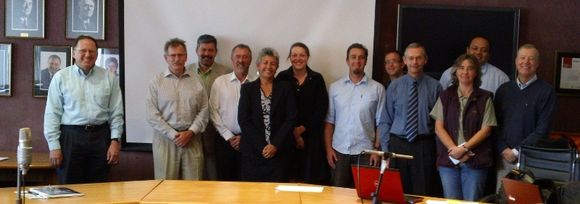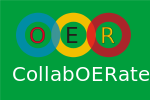Meeting Summary - 23 Feb 2011

The OER Foundation hosted a strategic international planning meeting for the OER for assessment and credit for students project at Otago Polytechnic on 23 February 2011 in Dunedin. New Zealand. The project aims to provide flexible pathways for learners from across the globe who have accessed open education courses to be assessed and earn credible qualifications for their work on a fee-for-service basis. Athabasca University, Otago Polytechnic and the University of Southern Queensland are collaborating as anchor partners in building an OERu. As an open project, all interested post-secondary institutions may join the initiative as anchor partners.
If you are interested in joining the OER university as an anchor partner, email Wayne Mackintosh, Director of the OER Foundation.

The meeting has commenced work on developing proposals for action relating to open business models, open pedagogy, open curriculum and open student support. An online follow-up meeting is planned to refine the draft proposals for action generated at the meeting including outputs, key performance indicators, milestones and budgets for securing external funding. This meeting will be conducted asynchronously. The follow-up meeting will most likely be hosted on the UNESCO OER community platform.
We envisage that the OER university will commence with two qualifications. First, foundation courses leading to a "Diploma of Arts" which will carry credit for Bachelor Degree qualifications thus focusing on the Community Service mission to widen access to degree study. Second, a Graduate Certificate in Tertiary Learning and Teaching, which will include an elective for OER. These qualifications will serve as pilot initiatives to refine and develop the model. The OER university welcomes the addition of more qualifications and OER materials to build a comprehensive spectrum of curriculum offerings.
Meeting highlights
- Realising the potential of OER, Dr Visesio Pongi, Director of the UNESCO Apia Office for the Pacific States. Samoa.
- Open but tough, Sir John Daniel, President and Chief Executive Officer, Commonwealth of Learning, Canada.
- Formal welcome and opening of the Meeting, Dr Robin Day, Chair of the OER Foundation Board and Deputy Chief Executive of Otago Polytechnic, New Zealand.
- We are making history today, Phil Ker, Chief Executive, Otago Polytechnic, New Zealand.
- The OER university: From logic model to action plan, Keynote address. Professor Jim Taylor, AM., University of Southern Queensland, Australia.
- Inputs from the SCoPE pre-meeting seminar hosted by BCcampus, Paul Stacey, BCcampus, Canada.
- Meet the participants, Personal introductions from Dunedin Participants, New Zealand.
- Building the OER ecosystem for free online degrees, Alana Harrington, Saylor Foundation
Meeting highlights
Dr Visesio Pongi, UNESCO
Realising the potential of OER
UNESCO asks planners of the OER university to find sustainable and scalable solutions to these key questions:
|
Sir John Daniel, Commonwealth of Learning
| Open but tough Transcript of the video available on the COL website
Sir John Daniel, President and Chief Executive Officer of the Commonwealth of learning provides well-founded advice for the planning of the OER university, drawing on the international experience of open distance learning. "Students seek flexible study opportunities, but they also want their achievements recognised in credible credentials." said John Daniel. "This important meeting should tackle the challenges of combining flexibility with rigour, which requires clarity in conception and quality in execution." Sir John highlights two strategic questions for the planning of the OER university:
|
Dr Robin Day, OER Foundation
Formal welcome to participants
|
Phil Ker, Otago Polytechnic
We are making history today
Phil Ker, Chief Executive Officer of Otago Polytechnic outlines the leadership rationale for engagement in the OER university concept. Otago Polytechnic was the world's first higher education institution to adopt a default Creative Commons Attribution intellectual property policy. Phil highlights his reflections on a path which is aspirational but achievable:
|
Prof Jim Taylor, AM. University of Southern Queensland
The OER university: From logic model to action plan.
|
Paul Stacey, BCcampus
Inputs from the SCoPE pre-meeting seminar hosted by BCcampus
BCcampus in Canada hosted a pre-meeting SCoPE seminar in preparation for the OER university meeting. The seminar was intended to generate discussion and input on the context, problem, concept, partners, and objectives of an OER university. Paul Stacey, who facilitated the online seminar prepared a summary of the inputs from SCoPE seminar The meeting connected with Paul in Canada via audio link and streamed the teleconference via the Ustream broadcast for the meeting. These inputs will be transferred to the issues and possible solutions for each of the initiatives of the logic model for the OER university. |
Meet the participants
Introductions from the face-to-face participants in Dunedin
We have noted the apologies from the following attendees who due to flight cancellations across New Zealand were unable to make the meeting in Dunedin: Associate Professor Mark Brown, Director, Teaching, Learning & Distance Education, Massey University, New Zealand; Associate Professor Richard K. Coll, Pro Vice-Chancellor, Teaching & Learning. University of Waikato, New Zealand; Dr Herbert Thomas, Electronic Learning Media Team Leader, Digital Media Group, University of Canterbury, New Zealand; Vasi Doncheva, Flexible Learning Manager, Northtec, New Zealand; Lynda Mathey, Director Educational Services NorthTec, New Zealand; Darren Harkness, Athabasca University, Canada; Annabel Schuler, Education Support Services Manager, Tai Poutini Polytechnic, New Zealand; and Professor Niki Davis, Professor of e-Learning, University of Canterbury and President of DEANZ, New Zealand. We invite you to meet the +200 participants from +45 countries who registered as virtual participants. |
Alana Harrington, Saylor Foundation
Building the OER ecosystem for free online degrees
We were unable to stream this video during the meeting. A hgher resolution version of video available on YouTube |
References
- ↑ Taylor, J.C. 2007. Open courseware futures: Creating a parallel universe. e-Journal of Instructional Science and Technology (e-JIST), Vol 10, No. 1. Online: http://www.ascilite.org.au/ajet/e-jist/docs/vol10_no1/papers/full_papers/taylorj.htm. Retrieved 16 January 2011.

